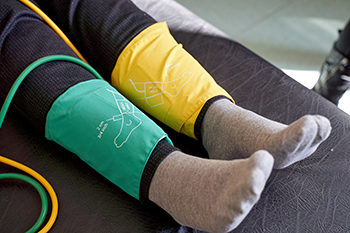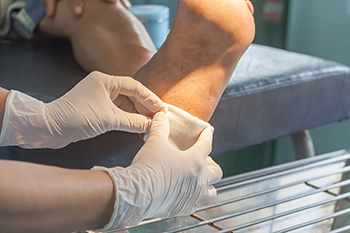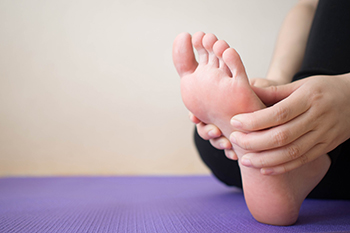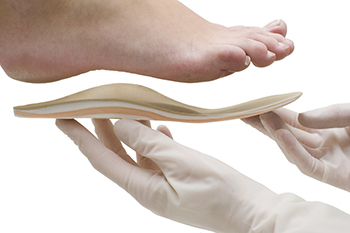Connect With Us
Blog
Items filtered by date: October 2023
Need for Vascular Testing With Lower Extremity Issues

Peripheral vascular disease, also known as PVD, is a prevalent issue, especially among diabetics. It affects over five million people each year and contributes to complications such as lower extremity wounds and amputations. Given its widespread incidence, obtaining an accurate diagnosis is critical for effective management and prevention of severe outcomes. There are non-invasive screening methods that podiatrists can incorporate into their initial patient evaluations, and they are deemed highly effective for identifying peripheral arterial diseases, particularly in at-risk populations. If you have PVD or lower extremity issues, it is strongly suggested that you make an appointment with a podiatrist for a comprehensive vascular assessment and treatment.
Vascular testing plays an important part in diagnosing disease like peripheral artery disease. If you have symptoms of peripheral artery disease, or diabetes, consult with one of our podiatrists from Comprehensive Foot & Ankle Center. Our doctors will assess your condition and provide you with quality foot and ankle treatment.
What Is Vascular Testing?
Vascular testing checks for how well blood circulation is in the veins and arteries. This is most often done to determine and treat a patient for peripheral artery disease (PAD), stroke, and aneurysms. Podiatrists utilize vascular testing when a patient has symptoms of PAD or if they believe they might. If a patient has diabetes, a podiatrist may determine a vascular test to be prudent to check for poor blood circulation.
How Is it Conducted?
Most forms of vascular testing are non-invasive. Podiatrists will first conduct a visual inspection for any wounds, discoloration, and any abnormal signs prior to a vascular test.
The most common tests include:
- Ankle-Brachial Index (ABI) examination
- Doppler examination
- Pedal pulses
These tests are safe, painless, and easy to do. Once finished, the podiatrist can then provide a diagnosis and the best course for treatment.
If you have any questions, please feel free to contact our offices located in Lehigh Ave and Nazareth Hospital in Philadelphia, Collegeville Darby, and Langhorne, PA . We offer the newest diagnostic and treatment technologies for all your foot care needs.
We Can Treat Your Foot or Ankle Pain
Offloading for Foot Wounds

Pressure on the foot causes 90 percent of foot sores in diabetic patients. To heal these sores, it is necessary to reduce the pressure. Offloading in the context of foot wounds refers to the process of reducing or redistributing pressure away from a specific area of the foot that has a wound or is at risk of developing one. By offloading, the affected area gets relief, which allows it to heal without being constantly subjected to pressure or friction. This is especially critical for individuals with diabetes, as they may have neuropathy and might not feel pain from a developing wound. Methods for offloading include using specialized footwear, casts, orthotics, and padding. The goal is to protect the wound, give it the best environment to heal, and prevent further complications. If you have diabetes and suffer from foot sores, it is strongly suggested that you make an appointment with a podiatrist who can evaluate your condition and make appropriate treatment recommendations.
Wound care is an important part in dealing with diabetes. If you have diabetes and a foot wound or would like more information about wound care for diabetics, consult with one of our podiatrists from Comprehensive Foot & Ankle Center. Our doctors will assess your condition and provide you with quality foot and ankle treatment.
What Is Wound Care?
Wound care is the practice of taking proper care of a wound. This can range from the smallest to the largest of wounds. While everyone can benefit from proper wound care, it is much more important for diabetics. Diabetics often suffer from poor blood circulation which causes wounds to heal much slower than they would in a non-diabetic.
What Is the Importance of Wound Care?
While it may not seem apparent with small ulcers on the foot, for diabetics, any size ulcer can become infected. Diabetics often also suffer from neuropathy, or nerve loss. This means they might not even feel when they have an ulcer on their foot. If the wound becomes severely infected, amputation may be necessary. Therefore, it is of the upmost importance to properly care for any and all foot wounds.
How to Care for Wounds
The best way to care for foot wounds is to prevent them. For diabetics, this means daily inspections of the feet for any signs of abnormalities or ulcers. It is also recommended to see a podiatrist several times a year for a foot inspection. If you do have an ulcer, run the wound under water to clear dirt from the wound; then apply antibiotic ointment to the wound and cover with a bandage. Bandages should be changed daily and keeping pressure off the wound is smart. It is advised to see a podiatrist, who can keep an eye on it.
If you have any questions, please feel free to contact our offices located in Lehigh Ave and Nazareth Hospital in Philadelphia, Collegeville Darby, and Langhorne, PA . We offer the newest diagnostic and treatment technologies for all your foot care needs.
Different Types of Foot Arthritis

Arthritis is characterized by inflammation in one or more joints, leading to pain and stiffness. It is prevalent in the small joints of the foot and ankle, impacting mobility and daily activities. While there is no cure for arthritis, treatment options can help manage symptoms and slow disease progression. The foot and ankle play vital roles in supporting, balancing, and absorbing shock during activities. These areas contain multiple joints and are susceptible to various forms of arthritis like osteoarthritis, rheumatoid arthritis, and gout. Osteoarthritis gradually erodes joint cartilage, causing pain, stiffness, and bone spurs. Risk factors include age, obesity, genetics, and poor foot alignment. Rheumatoid arthritis is a chronic autoimmune disease that can start in the foot and ankle, leading to joint inflammation, swelling, and deformity. Genetic and environmental factors can trigger this condition. Gout is a painful inflammation that often affects the big toe joint due to the accumulation of uric acid crystals. It can lead to sudden and severe joint pain. If you have foot or ankle discomfort from arthritis, it is suggested that you make an appointment with a podiatrist to determine which kind of arthritis is affecting you.
Arthritis can be a difficult condition to live with. If you are seeking treatment, contact one of our podiatrists from Comprehensive Foot & Ankle Center. Our doctors can provide the care you need to keep you pain-free and on your feet.
Arthritic Foot Care
Arthritis is a term that is commonly used to describe joint pain. The condition itself can occur to anyone of any age, race, or gender, and there are over 100 types of it. Nevertheless, arthritis is more commonly found in women compared to men, and it is also more prevalent in those who are overweight. The causes of arthritis vary depending on which type of arthritis you have. Osteoarthritis for example, is often caused by injury, while rheumatoid arthritis is caused by a misdirected immune system.
Symptoms
- Swelling
- Pain
- Stiffness
- Decreased Range of Motion
Arthritic symptoms range in severity, and they may come and go. Some symptoms stay the same for several years but could potentially get worse with time. Severe cases of arthritis can prevent its sufferers from performing daily activities and make walking difficult.
Risk Factors
- Occupation – Occupations requiring repetitive knee movements have been linked to osteoarthritis
- Obesity – Excess weight can contribute to osteoarthritis development
- Infection – Microbial agents can infect the joints and trigger arthritis
- Joint Injuries – Damage to joints may lead to osteoarthritis
- Age – Risk increases with age
- Gender –Most types are more common in women
- Genetics – Arthritis can be hereditary
If you suspect your arthritis is affecting your feet, it is crucial that you see a podiatrist immediately. Your doctor will be able to address your specific case and help you decide which treatment method is best for you.
If you have any questions, please feel free to contact our offices located in Lehigh Ave and Nazareth Hospital in Philadelphia, Collegeville Darby, and Langhorne, PA . We offer the newest diagnostic and treatment technologies for all your foot care needs.
Various Causes of Foot Pain

Foot pain can be a significant discomfort that affects people of all ages and lifestyles. It is essential to understand that various factors can contribute to this common ailment. One common culprit is wearing improper footwear. Ill-fitting shoes or those lacking proper arch support can lead to a range of foot problems, ranging from bunions to plantar fasciitis. Overuse and excessive physical activity can also strain the feet, leading to pain. Athletes, in particular, are susceptible to conditions such as stress fractures and Achilles tendonitis due to repetitive movements. Certain medical conditions, such as arthritis or diabetes, can result in chronic foot pain, as they affect joint health and circulation. Additionally, age related changes, which can include reduced fat padding in the feet, may lead to discomfort, especially while walking or standing for extended periods. Addressing foot pain often requires a multifaceted approach, including wearing proper footwear, rest, and sometimes medical intervention. By recognizing the various causes, individuals can take proactive steps to alleviate foot pain and maintain healthy, pain-free feet. If you have any type of foot pain, it is strongly suggested that you contact a podiatrist as quickly as possible who can determine what the cause is, and offer treatment methods that are right for you.
Foot Pain
Foot pain can be extremely painful and debilitating. If you have a foot pain, consult with one of our podiatrists from Comprehensive Foot & Ankle Center. Our doctors will assess your condition and provide you with quality foot and ankle treatment.
Causes
Foot pain is a very broad condition that could be caused by one or more ailments. The most common include:
- Bunions
- Hammertoes
- Plantar Fasciitis
- Bone Spurs
- Corns
- Tarsal Tunnel Syndrome
- Ingrown Toenails
- Arthritis (such as Gout, Rheumatoid, and Osteoarthritis)
- Flat Feet
- Injury (from stress fractures, broken toe, foot, ankle, Achilles tendon ruptures, and sprains)
- And more
Diagnosis
To figure out the cause of foot pain, podiatrists utilize several different methods. This can range from simple visual inspections and sensation tests to X-rays and MRI scans. Prior medical history, family medical history, and any recent physical traumatic events will all be taken into consideration for a proper diagnosis.
Treatment
Treatment depends upon the cause of the foot pain. Whether it is resting, staying off the foot, or having surgery; podiatrists have a number of treatment options available for foot pain.
If you have any questions, please feel free to contact our offices located in Lehigh Ave and Nazareth Hospital in Philadelphia, Collegeville Darby, and Langhorne, PA . We offer the newest diagnostic and treatment technologies for all your foot care needs.
Custom Orthotics and Foot Health

Orthotics are specialized shoe inserts, or insoles, designed to provide support, cushioning, and alignment to the feet. These custom-made devices are prescribed to individuals for various reasons, aiming to address a range of foot-related issues and improve overall foot health. One of the primary reasons to wear orthotics is to alleviate pain and discomfort associated with conditions such as plantar fasciitis, flat feet, or bunions. These devices can help distribute pressure more evenly across the foot, reducing strain and preventing further damage. Orthotics can also improve alignment, correct gait abnormalities, and support the arches. This can be beneficial for individuals with irregular foot structures or those who engage in high impact activities. Additionally, orthotics can aid in injury prevention by promoting proper biomechanics and reducing stress on the feet, knees, hips, and lower back. Orthotics can be a valuable tool for maintaining foot health, preventing injuries, and enhancing overall comfort and mobility. If you would like more information about the benefits of custom orthotics, it is suggested that you schedule an appointment with a podiatrist.
If you are having discomfort in your feet and would like to try orthotics, contact one of our podiatrists from Comprehensive Foot & Ankle Center. Our doctors can provide the care you need to keep you pain-free and on your feet.
What Are Orthotics?
Orthotics are inserts you can place into your shoes to help with a variety of foot problems such as flat feet or foot pain. Orthotics provide relief and comfort for minor foot and heel pain but can’t correct serious biomechanical problems in your feet.
Over-the-Counter Inserts
Orthotics come in a wide variety of over-the-counter inserts that are used to treat foot pain, heel pain, and minor problems. For example, arch supports can be inserted into your shoes to help correct overarched or flat feet, while gel insoles are often used because they provide comfort and relief from foot and heel pain by alleviating pressure.
Prescription Orthotics
If over-the-counter inserts don’t work for you or if you have a more severe foot concern, it is possible to have your podiatrist prescribe custom orthotics. These high-quality inserts are designed to treat problems such as abnormal motion, plantar fasciitis, and severe forms of heel pain. They can even be used to help patients suffering from diabetes by treating foot ulcers and painful calluses and are usually molded to your feet individually, which allows them to provide full support and comfort.
If you are experiencing minor to severe foot or heel pain, it’s recommended to speak with your podiatrist about the possibilities of using orthotics. A podiatrist can determine which type of orthotic is right for you and allow you to take the first steps towards being pain-free.
If you have any questions please contact our offices located in Lehigh Ave and Nazareth Hospital in Philadelphia, Collegeville Darby, and Langhorne, PA . We offer the newest diagnostic and treatment technologies for all your foot and ankle needs.

